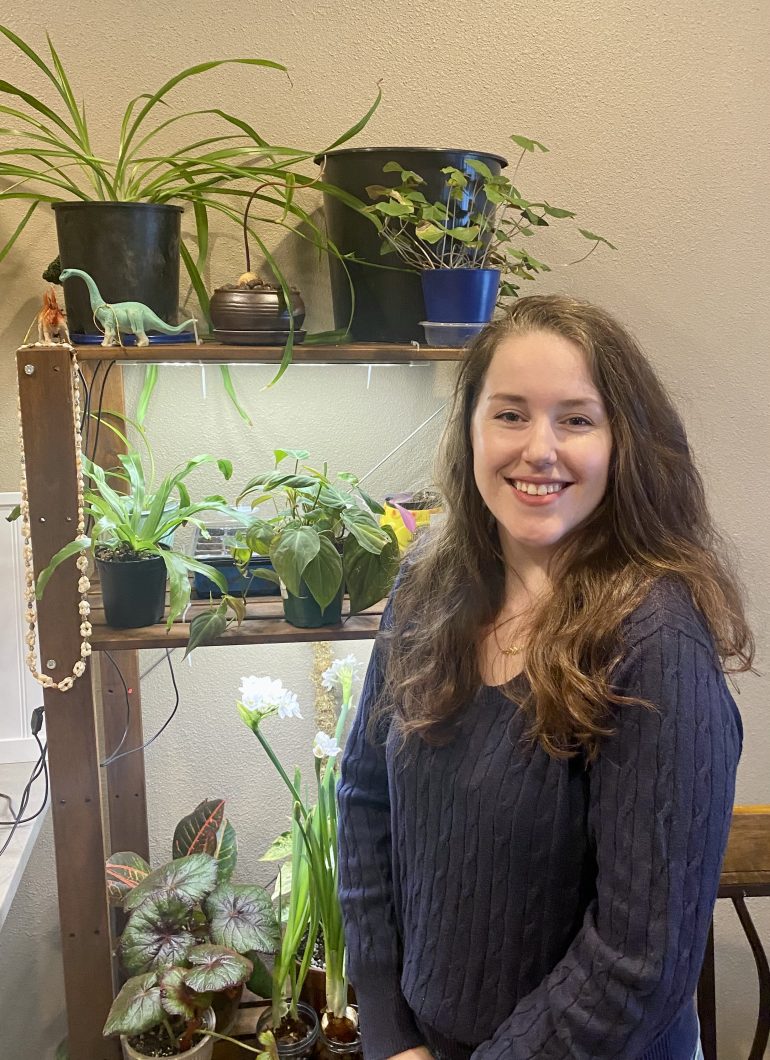Ever consider surrounding yourself with lush green foliage? Think Adam and Eve, think FernGully, think Plantopia, and now you have the picture of the life of PSU Psychology student, Brittani Wallsten. Wallsten surrounds herself, and her partner, with an abundance of living, growing, oxygen-generating plants. She loves plants and the joy they bring her, so when she was given the assignment to do a qualitative research project for her Urban Social Sciences class, it was only natural for her to choose a plant-related topic.
Wallsten moved to Portland three years ago from California. She has long brown hair with wavy curls cascading down, and when she smiles, you have to smile with her. She is a senior and will graduate soon with a psychology degree and a minor in neuroscience.
Wallston had already begun raising and caring for plants as a COVID-related coping mechanism for herself.
“I killed most of my plants in the first year of having them because I didn’t know what I was doing at all, and now I have like thirty or forty of them that I am keeping alive,” she said.
It was a learning curve.
Her research question asked what the mental health benefits of having houseplants in one’s dorm during the COVID lockdown were. Wallsten looked into four metrics: aesthetics, routine, positive responsibility, and using houseplants to indicate one’s health status. At the time of her research, the campus was sparsely populated, as most students left and continued to learn remotely. Only a few brave souls remained in the dorms, and those that remained were separated—one per room and just a few per floor. Wallsten empathized with these students, coming to a new city expecting the typical college experience and then being isolated.
For her research, Wallsten interviewed four students and also hosted a focus group. The data that came out of this qualitative report might not be hugely surprising, but just the same, it was very thoughtful, clear, and novel.
As stated in Wallsten’s article, Houseplants were found to support students’ mental health by encouraging a regular routine, providing opportunities for responsibility, adding aesthetic value, and serving as a general indicator of mental health. Plants encourage a regular and timely routine which is a good thing for anyone, providing responsibility and moving past a sense of self-absorption.
“There is a term, “accidental narcissism,” when you are so focused on your inner world that you have a hard time reaching out and connecting with other people,” Wallsten explained. Having something small that pulls you out of yourself, like pay attention to this tiny little spider plant for five minutes. That can start building this momentum of pulling you out of that deep dark place.
For example, Wallsten said., “you would have folks that are really struggling with intense depression or psychosis or whatever, and then just in the middle of a conversation, they will be like, ‘that looks nice, today.’ She said the plant would actually pull people out of their heads into a “tangible, practical, beautiful thing.”
A warning after all these lovely houseplant miracles for mental health: please don’t rush out and buy all of your friends a plant gift.
“If anyone were to give me a plant, I would be over the moon,” Wallsten said. But she went on to inform that just as you would not give a living animal as a gift it is also not wise to give a houseplant as a gift. Some may not enjoy the added responsibilities of taking care of a living thing and if the plant were to expire this might even add to their stress and feelings of incompetence.
“It was interesting to get those mixed perspectives in the group,” Wallsten said.
In addition to being a full-time student, Wallsten works at a residential mental health treatment home. And if that is not enough, she also works in a Legacy Health neuroscience research laboratory. After graduation, Wallsten hopes to enter OHSU psychiatric mental health nurse practitioner program. She said she would like to “continue in mental health, more of a medical avenue than I have been.”
As Wallsten reports in her article, this study brought answers, but also more questions.
Wallsten’s article titled Houseplants as Mental Health Supports for Dorm Occupants During the Lockdown Period at Portland State University can be found in Vol 11 (2022) of ANTHOS (the undergraduate research journal).





